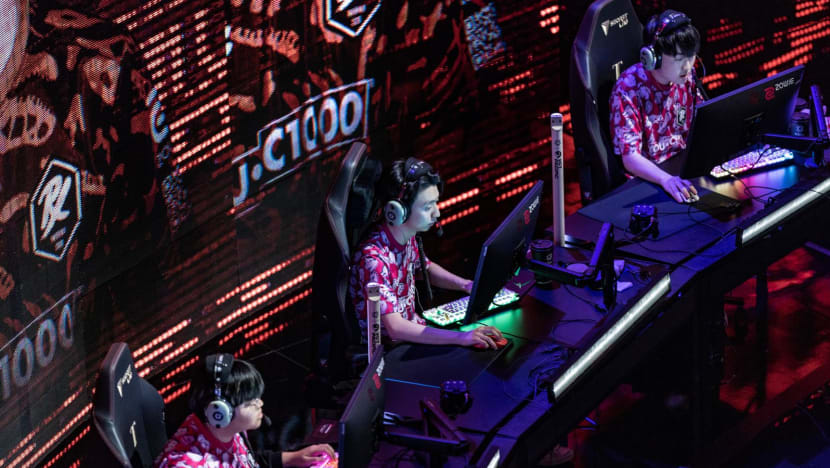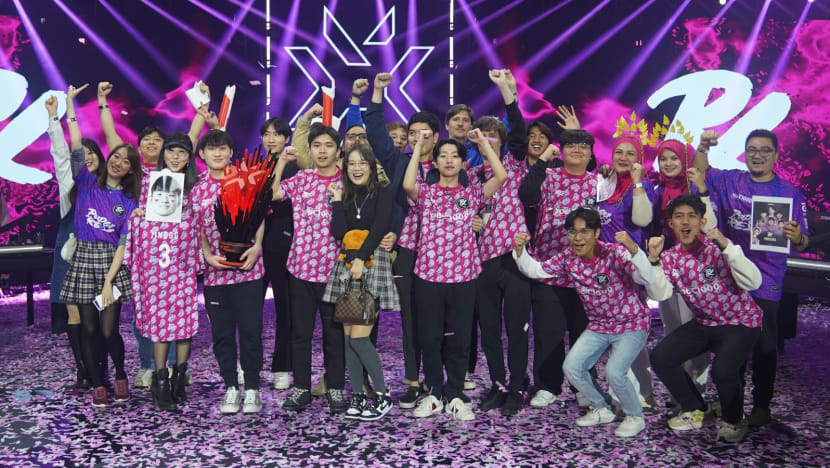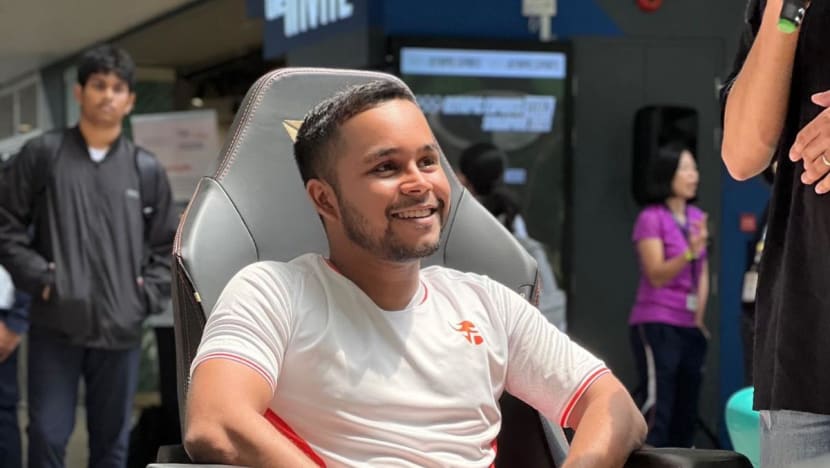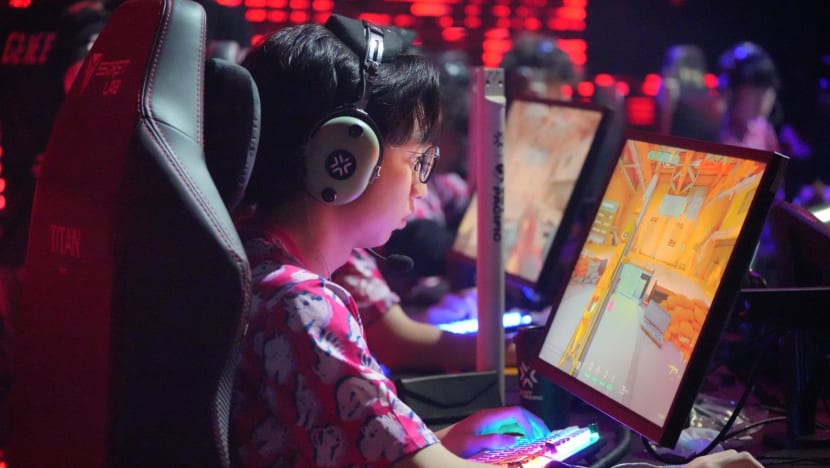IN FOCUS: ‘You’ll never catch the cheats’ – how the dark side of e-sports threatens its growth
A professional in Singapore was recently convicted for throwing a match, shortly after the country's first ever e-sports gold medal at the Southeast Asian Games was shrouded in controversy. CNA explores how the industry is dealing with such growing pains.

Paper Rex's Valorant team taking part in the 2023 Valorant Champions Tour Pacific League. (Photo: Riot Games)
SINGAPORE: What does it take to send a group of 20-something year-olds halfway across the world to compete in – and win – an international gaming competition watched by millions?
The answer, according to Nikhil Hathiramani, is a lot closer to the commitments made by elite athletes like Rafael Nadal or Simone Biles.
“They work diligently, they have full eight to 10-hour days of training. Our coach has it programmed for them every week, it’s scheduled,” said the chief executive officer of Singapore-based e-sports team Paper Rex.
“They have training exercises, they have full days where sometimes they’re not even playing, they’re just watching the replays back, studying, the coaches going through theory. Some days they have competitions, we have mental performance coaches that we’ve outsourced for them and to guide our coach for better practices.
“They train Monday to Friday, sometimes they don’t even get a day off in the week because there’ll be training Monday to Friday and competitions Saturday through Sunday.”
Some suffer injuries to their wrists, elbows and shoulders, and have to see physiotherapists to ease the pain.
They also have to work on their personal branding and take interviews, press conferences and podcast appearances, added Mr Hathiramani, who is known more widely by his moniker nikH.
On top of all this, they jet around for competitions, which can be taxing during peak seasons.
Their efforts appear to have paid off, with the Paper Rex outfit making quite a name for itself in the Valorant sphere in recent years.
The tactical first-person shooter is one of the world’s fastest growing games, with more than 20 million players globally.
In the 2023 Valorant Champions Tour – a global tournament series – Paper Rex finished top of the regional Pacific League, bagging a US$100,000 prize. They also placed in the top 12 in the previous year’s Valorant Champions, a series-ending culmination of the respective leagues around the world, bringing home US$25,000.
Valorant, played in teams of five, was released in June 2020, just as the world was careening into the crisis that was the COVID-19 pandemic.
“It actually got released earlier … which was smart of (developer Riot Games) because they capitalised on the fact that everyone was at home on lockdown, with nothing much to do,” said Mr Hathiramani.
“And the game kind of exploded … it was in the right time and right place.”
But Valorant has also made headlines for reasons that are less than squeaky clean.
ACCUSATIONS OF CHEATING, MATCH FIXING EMERGE
At the multi-sport Southeast Asian (SEA) Games event in May, Singapore won its first ever e-sports gold medal – albeit a shared one with Indonesia – after a controversial Valorant grand final.
The Indonesians complained that Singapore had gained an unfair advantage by using a bug, which involved an in-game camera for players to track opponents' movements. Indonesia said this was not allowed; Singapore disputed this.
Players and officials wrangled over the rules well into the early hours of the next day, and Indonesia initially forfeited the final as a protest. But organisers later awarded both countries joint gold, following a review.
Shortly after this kerfuffle, 25-year-old professional Valorant player Malcolm Chung was sentenced to four months’ jail in Singapore and fined S$400 for deliberately losing a match, in order to win bets on an online gambling site.
Chung was captaining the RSG Resurgence Esports team in a prestigious regional tournament worth S$25,000.
A friend suggested to him that they bet on his team losing a match – and proposed that Chung intentionally throw the match. Chung told his team to do so.
The incident led to disquiet in the industry, with game developer Riot Games opening investigations into Chung and his team.
RSG’s head of e-sports Benjamin Lim – who was team manager at the time of the incident – told CNA the situation came to light after the community compiled a document full of evidence exposing the team’s crimes.
“We actually reported it to the authorities,” he said, adding that RSG conducted its own internal probe and cooperated fully with the authorities.
“It was definitely very disappointing and very sad. Because in e-sports, I think no matter how hard the game is, we put in as much effort as we can and losses are tough, just like in any other sport.
“And when you realise that people in the backend put in so much effort, and the other team mates that did not have anything to do with this put in so much effort – only to get cheated like that, it feels like shit.”
The spotlight on such transgressions is likely to intensify, with e-sports regularly making headlines for its tournament bounties – which continue to burgeon to mind-boggling figures.
The biggest prize pools are regularly put forth by an annual tournament in Dota 2, a multiplayer online battle arena or MOBA game released in 2013. Last year’s edition put US$18.9 million on the line while 2021 was history-making with US$40 million up for grabs.

Popular MOBA games include Mobile Legends: Bang Bang – which can be played on a phone – and League of Legends, the most-played game in the world.
These offerings, along with the likes of Valorant and battle royale game Fortnite, are also garnering live global audiences in the millions, who closely watch and follow players with a level of attention not unlike those paid to celebrities and influencers.
As e-sports works towards mainstream acceptance and recognition – and a standing on the world stage on par with traditional sports – one question emerging is how it can eliminate the cheating, match fixing and other bad behaviour on display in recent times.
MAKING IT “ALMOST IMPOSSIBLE” TO CHEAT
Team managers who used to be competitive gamers told CNA that anti-cheating and security measures in games and at high-level competitions are generally more secure than they were five years ago.
Valorant’s anti-cheat support programme, for instance, starts running once the game boots up and is quite robust, they said. The programme, also developed by Riot Games, cannot be turned off unless the player reboots the computer. If they successfully turn it off, they cannot play the game.
But in the football game FIFA, cheating is becoming more prevalent at an alarming speed, said professional player Syakir Abdul Rauf.
Mr Syakir, known by his in-game moniker Kun, recently qualified to represent Singapore at the eNations World Cup in Saudi Arabia in July.
The 27-year-old started playing professionally about six years ago, when he was still in school. He recently started a full-time job in the aerospace engineering industry, and his shift work allows him to spend about half his week training for FIFA.
While most FIFA players use consoles like the PlayStation or Xbox, the introduction of cross-platform play for those who use a computer has led to hacks or cheats emerging, said Mr Syakir, explaining that most consoles cannot be modified as much as a computer.
This leads to scenarios such as playing online against an AI (artificial intelligence) that is “really very good, almost impossible to win”, and experienced players can almost always tell when they encounter such cheating bots.
The solution is to report the player to Electronic Arts (EA) and wait for the developer to conduct checks and block the player’s IP address.
“Now every few months, there will be new features; new hacks they will use. Recently, they can have things like a speed boost, or their player will be extra big. It gets more and more creative,” said Mr Syakir.
Professional players, coaches and team managers from different e-sports acknowledged that at tournaments at the highest level, the presence of referees and officials checking players’ controllers and settings renders it “almost impossible” to cheat.

In Mobile Legends: Bang Bang, phones used in tournaments belong to the developer and referees also listen in on players’ communications with their team. And everything is recorded to provide evidence in the case of a dispute.
Players’ keyboards are even stored in a secured, separately located deposit box to ensure they are not tampered with, at the main international competition for multiplayer first-person shooter Overwatch.
The head coach for Singapore’s national Overwatch team Seetoh Jian Qing was pragmatic on the prospect of nabbing cheaters.
“It’s one of those things where you can only guess, because if the cheats are very good, you’ll never catch them,” he said.
In lower-level regional FIFA tournaments, some players still cheat by using stronger characters purchased using virtual coins from external third-party sites, said Mr Syakir.
EA's regulations forbid this, and players are usually caught when they qualify for an overseas tournament, where the developer will check their accounts for suspicious activity before permitting their participation.
Mr Syakir said some players have also been known to give wins to others, to help their friends qualify for regional tournaments.
Depending on the severity of their misdeeds, players can be banned from the game entirely or from competing for up to a few years.
ADAPTING RULES ON THE FLY
The case of the Singapore-Indonesia debacle at the 2023 SEA Games – which led to the Singaporeans being labelled “cheaters”, according to one of the players – has triggered discussions in the Valorant community over how things could have been handled better.
Industry figures spoke to the importance of a standardised set of rules, with Paper Rex CEO Mr Hathiramani citing a 20-page rulebook issued by Valorant’s developer ahead of official competitions.
But extensive regulations are just one piece of a puzzle.
For one, the quality of officials or referees differs depending on the scale of the tournament. Those organised by developers may come with professional referees, while those outsourced to regional organisers may lack resources or contacts to keep a tournament running as smoothly as it should.
Then there is the game itself – a constantly evolving product as developers regularly push out patches or bug fixes. These changes produce a vast range of possible scenarios and grey areas when it comes to the rules, said Mr Seetoh.
“The people behind the scenes, they can consult the rulebook, but at the same time, things can happen that are not in the rulebook, and they have to adapt on the fly. Right there and then, they have to make a decision,” he said.
The Overwatch coach said this lack of consistency could make it more difficult for e-sports to achieve the same kind of “prestige” as traditional sports.
The Singapore Esports Association’s programme manager Janet Su told CNA that Southeast Asia – where each country has an association – was the first to include e-sports at a major multi-sport event.
“From what happened with the SEA Games Valorant situation, I can tell there’s still a lot of improvements to be made,” she said, noting that it was only the second time e-sports was on the programme.
“The organisers change every time, so there’s always a lot of improvement that can be done every SEA Games, because there needs to be a way to hand down the knowledge from issue to issue.”
The 34-year-old is also a former professional gamer, and now serves as the team manager for all e-sports athletes representing Singapore at major Games.
“Sometimes people need to be reminded that this game (Valorant) is only three years old,” said Mr Hathiramani.
“There are games like Counter Strike that have been out for 20 years … It’s not to say that they didn’t have the same problems in their first one to two years. All these games did.”
ZERO TOLERANCE APPROACH
Even with the most airtight game and competition structures, it comes down to the players and their professionalism.
Mr Hathiramani told CNA how, in 2020, Paper Rex signed a team of Valorant players who were the best in Singapore at the time.
“But you don’t really know the people until you start working with them, right? Quite quickly, we started to notice certain behaviours. It started with things like the players showing up late, not communicating or just generally having a bit of lower work ethic,” he said. “And those just started to raise a few question marks and red flags.”
The issues grew more apparent, and more flagrant: At one key tournament, the team was “looking really strong” but abruptly lost in the grand finals.
Paper Rex’s management then spoke to the players individually to inform them of the decision to release them, based on unprofessional behaviour and poor performance.
It was at this point where it came to light that the team had deliberately thrown a match in a competition two months prior, said Mr Hathiramani, adding that some of them pointed to one teammate as the instigator.
Paper Rex later found out that this player was also friends with Chung, who was sentenced in May.
Professional players and team managers described Singapore’s e-sports community at large as having zero tolerance for cheating and match fixing.
The consequences are serious and straightforward: Their contracts are immediately terminated, they are banned from participating in tournaments and they may be reported to the authorities, like with Chung.
RSG, his e-sports organisation at the time, have made an example of Chung and his team, using the case to remind their current players about the real-life consequences of cheating or match fixing.
Mr Hathiramani reserved some sympathy for players who get entangled in such incidents and end up blacklisted, despite not being the main instigators.
“As a player, you fear for your spot on the team if you rock the boat or go against your captain. And if someone has a lot of influence, someone who’s a good talker, players will just be afraid,” he said.
“So the easier solution for them is to stay quiet. But what they don’t realise is that by staying quiet, they become an accomplice.”
TOXIC PEOPLE “LIKE HYDRA”
Interviewees for this story were also keen to discuss the perception of e-sports culture as inherently toxic and home to a cesspool of people with bad online attitudes.
This includes those who rain down personal attacks on teammates for performing badly, show off their colourful and inappropriate vocabulary, or engage in more insidious behaviour like stalking or harassing other gamers.
Ways to report and ban these players exist in almost every game. But the problem is only alleviated temporarily, said Mr Seetoh, the Overwatch coach.
“It’s like Hydra,” he explained, referring to the many-headed mythical monster. “Even if (game developers) improve their banning system, it doesn’t matter, because another toxic person will take their place, someone else will say something equally stupid.”
Mr Seetoh said the best Overwatch players in Singapore were also "some of the most toxic players" who've been banned multiple times by developer Blizzard.
"Do you pick the less toxic people and know that you're going to lose, or do you pick the best players and try to control them?" he asked.
In May, Singapore's national Overwatch team kicked out three players for what Mr Seetoh described as persistent toxic and unprofessional behaviour. The news made waves and divided opinion in the local community.
Mr Hathiramani said the issue goes beyond gaming and extends to “netizen culture”.
“When you have people who have the safety and security and security of hiding behind their monitor and keyboard, they’re going to say and do things that, if you met the same people in person, you’d probably would never know that they’d talk to you like that on the internet,” he said, acknowledging that gaming can bring out the worst in them.
“They’re hiding behind an avatar, a game character. They don’t actually have to reveal who they are … whatever they do in the outside world doesn’t matter, what only matters here is the outcome of the game.”
Professionals may be benched, suspended or immediately terminated depending on the severity of their toxic behaviour, said team managers.
When recruiting players, top teams usually ask for character references and do their own background checks to see if regulars in the community have had negative experiences with them.
Mr Lim of RSG said education was the best approach.
Younger professional players – many are signed between the ages of 14 and 16 – may lack a proper mentor or coach to guide them, and may idolise popular players who engage in toxic behaviour, said Mr Seetoh.
“A lot of these players, they go from a position where they are students … and then straight away they play, whether or not they drop out of school,” he said. “Some of them don’t understand what consequences mean, they just end up regretting when they get kicked out of the team.”
Mr Hathiramani said they were essentially still “uninformed kids”.
“You can’t put a 15-year-old under the same microscope as someone who’s 25 … One way to make this issue happen less is to put more attention on it and be more transparent and call out the bad apples.
“But it’s a sensitive line to cross … You’re talking about a teenager here, this could be his entire career, not just in gaming but everywhere, if it becomes a big enough story."
Nobody in e-sports wants the nascent industry to make headlines only for its issues, be it cheating, match fixing or toxic behaviour, said Mr Hathiramani.
"Mishaps do happen," he pointed out. "I mean, it happens in traditional sports as well, all the time."


“MAKE A CAREER OUT OF IT”?
Beyond weeding out the wrongdoers, more support from families, community and the private sector would go a long way in helping e-sports stand tall, said professional players and team managers.
Mr Syakir, the FIFA player, recalled hiding his professional career from his parents when he started out. “I wasn’t doing so well in my studies at that point, and I was focusing a lot on playing these games, so I didn’t tell my parents.”
But his parents found out by chance when an overseas tournament he was playing in was televised.
“They were watching me play on TV, and I went all the way to the finals,” he laughed. “That’s when they said, ‘oh okay, this is something that you do, that you can make a career out of.'”
Mr Syakir himself didn’t think that would be possible when he began playing FIFA.
“Getting paid thousands of dollars in prize money – nobody would expect that when you’re at the age of 16, just playing a game you like for fun.”

It’s not just the players – the growth of the industry can support a whole host of careers and full-time jobs spanning managers, coaches, accountants, referees, tournament officials and more, said Mr Hathiramani.
Two of his team’s members, Indonesian Jason Susanto or f0rsakeN and Singaporean Wang Jing Jie or Jinggg, are often cited as one of the best duos in the region.
“Humble brag, but I know we are the best team in Asia Pacific right now based on recent results, and a big part of that is because of the players we have. But I think a big part of why our players are so good is because their family units are very supportive,” said Mr Hathiramani.
Wang’s mother travels to all his events and is “never not there”, while Susanto’s father is his manager and helps negotiate contracts and other agreements.
“I think that plays a big part into why they are both very successful players,” said Mr Hathiramani. “Because they never really had to deal with this energy-draining aspect of their parents blocking them from pursuing their dreams.
“In my experience, I think that is a very underrated, overlooked aspect; having that wider acceptance from general society will go a long way in making e-sports mainstream.”










.png?itok=wlyeDwqW)








